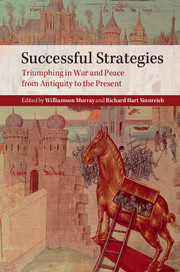Book contents
- Frontmatter
- Dedication
- Contents
- List of tables and map
- List of contributors
- Acknowledgments
- Introduction
- 1 The strategic thought of Themistocles
- 2 The grand strategy of the Roman Empire
- 3 Giraldus Cambrensis, Edward I, and the conquest of Wales
- 4 Creating the British way of war: English strategy in the War of the Spanish Succession
- 5 Failed, broken, or galvanized?
- 6 Victory by trial and error: Britain’s struggle against Napoleon
- 7 The strategy of Lincoln and Grant
- 8 Bismarckian strategic policy, 1871–1890
- 9 Dowding and the British strategy of air defense 1936–1940
- 10 US naval strategy and Japan
- 11 US grand strategy in the Second World War
- 12 American grand strategy and the unfolding of the Cold War 1945–1961
- 13 The Reagan administration’s strategy toward the Soviet Union
- Afterword
- Index
- References
6 - Victory by trial and error: Britain’s struggle against Napoleon
Published online by Cambridge University Press: 05 June 2014
- Frontmatter
- Dedication
- Contents
- List of tables and map
- List of contributors
- Acknowledgments
- Introduction
- 1 The strategic thought of Themistocles
- 2 The grand strategy of the Roman Empire
- 3 Giraldus Cambrensis, Edward I, and the conquest of Wales
- 4 Creating the British way of war: English strategy in the War of the Spanish Succession
- 5 Failed, broken, or galvanized?
- 6 Victory by trial and error: Britain’s struggle against Napoleon
- 7 The strategy of Lincoln and Grant
- 8 Bismarckian strategic policy, 1871–1890
- 9 Dowding and the British strategy of air defense 1936–1940
- 10 US naval strategy and Japan
- 11 US grand strategy in the Second World War
- 12 American grand strategy and the unfolding of the Cold War 1945–1961
- 13 The Reagan administration’s strategy toward the Soviet Union
- Afterword
- Index
- References
Summary
On 15 July 1815, wearing the uniform of a chasseur of the Imperial Guard, Napoleon Bonaparte surrendered to Captain Frederick Maitland, commanding the British ship-of-the-line Bellerophon, blockading the French Atlantic port of La Rochelle. His surrender concluded a war that, with one brief interruption, had consumed Britain for 22 years, and that ended by propelling her to a position of preeminence among the world’s great powers that she would retain for more than a century.
There was no reason for British leaders to expect that happy result when, on 1 February 1793, France’s Revolutionary government declared war on Britain and Holland. On the contrary, the evidence suggests that the British government went to war against France with considerable reluctance. Politically, the French Revolution had divided the country, fracturing even the reformist Whigs. Economically, Britain was still recovering from the injurious effects of her unsuccessful effort to suppress the American rebellion. Nor was there any great feeling of obligation toward France’s deposed Louis XVI, the same Louis XVI who had helped defeat that effort. Conservatives such as Edmund Burke might rail against the revolution’s excesses, and Britons like most other Europeans were shocked by Louis’ execution and that of his queen. But few were interested in fighting to restore what even many British conservatives recognized as a corrupt and despotic Bourbon monarchy. All in all, as one writer put it, “So far as Britain was concerned, every consideration of national self-interest warned her away from involvement in French affairs.” As the context of the war, the character of the enemy, and the interests at stake mutated during the conflict, however, so also did British war aims and her approach to achieving them. The struggle against Napoleonic France thus offers a useful context in which to examine the wartime evolution of military strategy.
- Type
- Chapter
- Information
- Successful StrategiesTriumphing in War and Peace from Antiquity to the Present, pp. 155 - 188Publisher: Cambridge University PressPrint publication year: 2014



